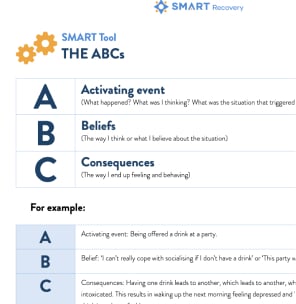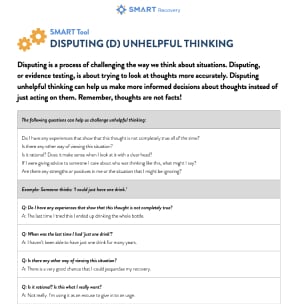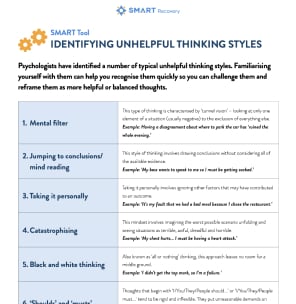Introduction: The Role of DIBs in Disputing Irrational Beliefs in SMART Recovery
In the realm of addiction recovery, the battleground is often not in the physical world but within the confines of our own minds. SMART Recovery, a program grounded in empowering individuals to break free from the chains of addictive behaviors, underscores the importance of mental liberation through the DIBs tool. An acronym for "Disputing Irrational Beliefs," DIBs is a central pillar in the SMART Recovery approach, guiding individuals through the process of identifying and challenging irrational beliefs that fuel addictive behaviors. This article illuminates the transformative power of DIBs in the journey toward sustainable recovery.
The Anatomy of DIBs
Irrational beliefs are distorted, self-sabotaging thoughts that often serve as the bedrock of addiction. These beliefs skew perception and decision-making, leading individuals down the path of self-destructive behaviors. The DIBs tool is designed to dismantle these harmful thought patterns by:
- Identifying Irrational Beliefs
The first step in utilizing DIBs is recognizing the irrational beliefs that lurk in one's mind. These might be beliefs about oneself, the world, or expectations of what life should be like. They are often absolute, unrealistic, and detrimental to one's wellbeing.
- Understanding the Link to Addictive Behaviors
DIBs emphasizes understanding how these irrational beliefs are directly fueling the addictive behavior. This insight is crucial, as it highlights the cause-and-effect relationship between beliefs and actions, underscoring the importance of mental health in recovery.
- Disputing the Beliefs
Once irrational beliefs are identified, the process of disputing begins. This involves challenging the validity of these beliefs, questioning their basis, and considering the evidence for and against them. Disputing is a critical thinking process, encouraging individuals to see things from a different, more rational perspective.
- Replacing with Rational Beliefs
After successfully disputing an irrational belief, the final step involves replacing it with a rational one. This new belief is realistic, flexible, and conducive to healthy living. It promotes positive behaviors and attitudes, contributing to a sustainable recovery.
DIBs in Action: The Heart of SMART Recovery
The DIBs tool is not just a technique; it's a paradigm shift. By continually practicing DIBs, individuals learn to automatically challenge their negative thought patterns, leading to profound changes in their mindset and behavior. This tool is based on the principles of Rational Emotive Behavior Therapy (REBT), a form of psychotherapy that posits that changing irrational beliefs leads to emotional and behavioral change.
Conclusion
Breaking free from addiction is, in essence, a liberation of the mind. The DIBs tool in SMART Recovery is a testament to the power of our thoughts in shaping our reality. By identifying, understanding, disputing, and replacing irrational beliefs, individuals reclaim the reins of their lives, steering away from addiction and toward a horizon of healing and hope. The journey is challenging, no doubt, but with tools like DIBs, SMART Recovery ensures that no one walks it unarmed.
Helpful Links
Related Tools
View all- Tool
Cost Benefit Analysis (CBA)
Performing a cost benefit analysis (CBA) helps individuals weigh the positives and negatives of a behavior, facilitating motivation, decision-making, and progression from precontemplation to the contemplation and preparation stage of change.
- Worksheet
Change Plan
The change plan worksheet captures and organizes essential elements of a plan, including desired changes, reasons, steps, helpers, success indicators, and obstacles.
- Tool
Urge Log
An awareness and understanding of urges is crucial to recovery. One way to understand urges is by recording them. After a few entries, participants may notice patterns and similarities about their urges. The log then becomes a road map that will help them to anticipate situations and emotions that may trigger urges and plan ways to avoid recognized triggers or distract themselves from the urge until it passes.
Tool Overview
The ABC Model is a good way of understanding how we can help change our feelings and behaviour by challenging our thinking.
When to Use This Tool
The ABC Model is a good way of understanding how we can help change our feelings and behaviour by challenging our thinking. It helps us uncover beliefs that are not helping us /contributing to the behaviour we are trying to change.
This exercise may be done in the group setting but can also be very useful for participants to look at between meetings.
How To Use This Tool
When working with urges: To analyze a lapse/relapse or to develop coping statements for an anticipated lapse/relapse.
In the event of a lapse, the question to ask is not “What made me do that”, but rather, “How did I talk myself into it?” It is not the urge (A) that causes the lapse (C). It is our beliefs (B); our irrational self-talk.With emotional upset:
The ABC Model can also be used to work with emotional upset or frustrations that may occur at any point in the recovery journey. The ABCs allow us to discover our unhelpful beliefs which contribute to emotional upsets. Disputing helps us eliminate our irrational thinking so we can both feel better and do better. In SMART Recovery we teach that we feel the way we think; it’s not unpleasant events that disturb us, it’s the way we think of them. By changing our thinking, we change how we feel.Identifying and Disputing Unhelpful Thinking.
Disputing is a process of challenging the way we think about situations. It’s about trying to look at thoughts more accurately. Disputing unhelpful thinking can help us make more informed decisions about thoughts instead of just acting on them. Balanced thinking leads to effective new beliefs.


